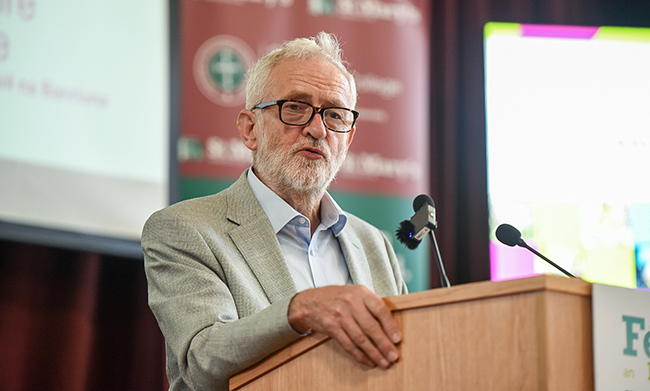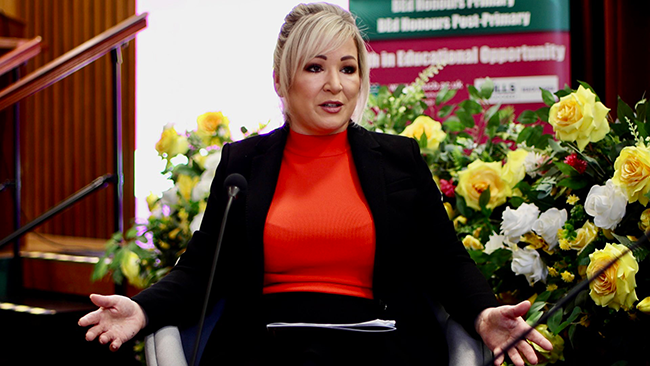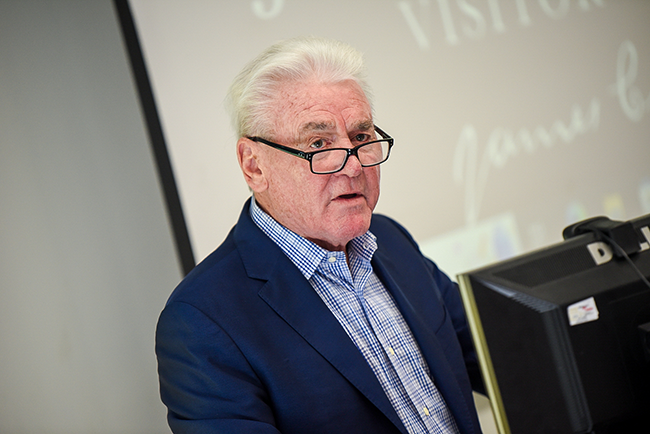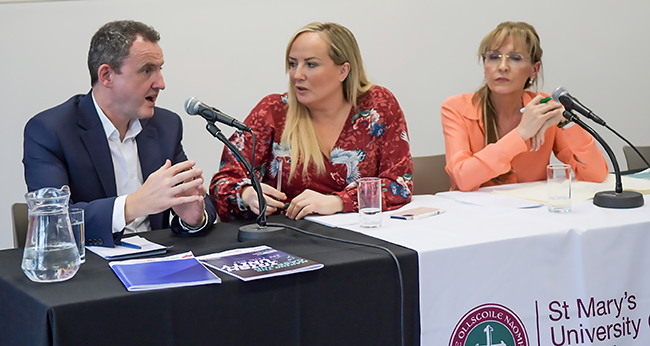31 August 2023 Edition
The inspiring spirit of Féile 35

Jim Gibney recaps the key moments from Féile 35, including standout contributions from Jeremy Corbyn, Michelle O’Neill, the ESRI’s Gerry McGuiness, Terry O’Sullivan, TDs Eoin Ó Broin and David Cullinane, and Seanadoirí Eileen Flynn and Niall Ó Donnghaile.
Born in one of the worst periods of the war in the summer of 1988, Féile an Phobal has been at the centre of the national debate about Ireland’s future across the broadest political spectrum for 35 years.
In his introductory comments to the booklet which carried the detail of Féile’s 85 events and the impressive visual arts and exhibitions section with 50 displays from artists across Ireland and abroad, Bill Rolston, Chair of the ‘Debates and Discussions Group’ said, “As I sit here, I have in front of me the programme of the first Féile an Phobal in 1988. It’s a large, single sheet folded in two and printed on both sides in red and black to create a four-page leaflet. Thirty five years later, the glossy full programme is like a four-wheel drive automatic car to the horse and cart of 1988. But the spirit of Féile remains what it was at its first offering. The same mixture of entertainment, craic and politics is there throughout.”
As Féile ended, organisers issued a tweet saying, “The total reach across our Féile an Phobail social media channels for Féile 35 was 35.2 million”. Over a ten day period, the irreplaceable venue that is St Mary’s University College hosted 85 events and the Visual Arts and Exhibitions.
Not surprisingly, Ireland’s constitutional future was foremost on the clár, with nearly 20 separate events and an informed ‘working assumption’, reflected in most of the formal and informal commentary, that a new and independent Ireland was a real and growing possibility as was a referendum on constitutional change.

• Former British Labour Party leader Jeremy Corbyn
Nearly 1,000 people attended the meeting where former British Labour Party leader Jeremy Corbyn spoke. It was standing room only for the interview with Michelle O’Neill by Andree Murphy and the ‘Ireland’s Future’ event was also oversubscribed.
‘Ireland’s Future’ presented a detailed argument calling for a referendum based on the Good Friday Agreement in 2030. It is working on a comprehensive document that will outline a detailed pathway from now until 2030 when it believes a constitutional referendum will be held. They also announced plans to hold a public meeting in the SSE arena on June 15th next year.
A report from an International Expert Panel on Impunity was presented by panel members Gisle Kvanvig and Brian Dooley. It examined state impunity for killings, torture, and collusion during the conflict here. It is a timely report in the midst of the British government’s Legacy Bill.
Research Professor at the Economic and Social Research Institute Seamus McGuinness gave a presentation on developing economic plans in the event of a successful referendum for reunification.
McGuinness posed the question of how North-South outcomes differ across key areas. According to McGuinness, future voters will require a clear vision to be set out in terms of how key areas of public provision will change in the event of a referendum ratifying reunification.

• Michelle O’Neill
Michelle O’Neill spoke to another packed meeting about the unstoppable momentum for constitutional change which was reflected in the Assembly election last May when the voters elected her as First Minister and in the local government election a few months ago when for the first time since over a century of Partition, more people voted pro-unity than pro-union.
O’Neill spoke about the importance of making powersharing work among the parties in the Executive who were open to it. O’Neill believes that there is no contradiction to having the North’s institutions functioning fully while advocating and promoting constitutional change.
The importance of women and young people in elected office was highlighted by O’Neill. More than half of Sinn Féin’s Assembly team are women. O’Neill believes that more women and young people were needed from all political parties.
Speaking about attending the funeral of Queen Elizabeth and the coronation of King Charles, Michelle O’Neill said that respect was at the base of her approach to these occasions. It was also important for the unionist and Protestant people to see her as First Minister in waiting, acting in their interests as First Minister for all.
Respect for unionists was also reflected in an event where unionists, Ian Marshall, Julie-Anne Corr, and Sarah Creighton argued the case for the Union. Another group, Claire Mitchel, Linda Ervine, and the Rev. Karen Sethuraman, presented stories of alternative Protestants lives.
Cultural recognition and accommodation now of the diversity of identities in advance of change to existing constitutional arrangements, particularly the British unionist identity, was the topic of debate for Judge Richard Humphreys, policy analyst Catriona Mullan, Professor Pete Shirlow, and academic and commentator Patricia Mac Bride.
There was a ‘homecoming feeling’ to a series of events organised by the Rev David Moore, Presbyterian Minister for the Mission of West Belfast, to introduce the history of the Presbyterian Churches in West Belfast. These events included a book launch in English and Irish involving Forbairt Feirste, ‘West Belfast’s Presbyterian Heritage: Bringing it Back Home’, a talk on the history of Albert Street Presbyterian Church and a gathering of former members and residents of Albert Street sharing memories and craic.
The title of the gathering, ‘So Much A Part of Us’, was from a speech made by the historian and veteran Sinn Féin member Tom Hartley who has published two books on the Protestant community, ‘Belfast City Cemetery’ and, about Presbyterians, ‘Balmoral Cemetery’.
Four members of the Oireachtas, Seanadoirí Eileen Flynn and Niall Ó Donnghaile and TDs Eoin Ó Broin and David Cullinane, contributed to Féile’s ambition to set political debate in a national context.
Eileen Flynn is the first Seanadóir from the Travelling community. She said Travellers never had a problem being Travellers. It is the state which has a problem. Both states have failed the Travellers. Travellers are the indigenous heart of Ireland; their language needs to be revived. At one stage, all Travellers spoke Irish, said Seanadóir Flynn, who also argued that Travellers are entitled to the same rights as the settled community and the institutions of both states should respect them and guarantee their human and civil rights.
Eoin Ó Broin, in conversation with Niall Ó Donnghaile about the housing crisis in the South, was spellbinding in the detail and expanse of his knowledge about the crisis and the solutions to the crisis.
Sinn Féin’s Oireachtas spokesperson on Health David Cullinane advocated for a national health service. He said Partition had created two very different systems, North and South and there is little shared public knowledge of the services – their advantages and disadvantages.
For Jarlath Burns, the President of the GAA in waiting, his presence at Féile was, in part, a romantic trip down memory lane. He was interviewed by Peter Finn, the principal of St Mary’s University College, in the University’s assembly hall where, as a student, he met his future wife.
Prior to the interview, he had attended the Gaels Le Chéile event and spoke about the GAA playing a constructive part in helping to change Irish society to bring about constitutional change.
Gaels Le Chéile reviewed their campaign plan which included collecting almost 20,000 signatures, meeting representatives of the Taoiseach’s office, and planning to expand its organisation inside the GAA.
Frank Connolly, trade unionist, socialist and lifelong activist, and author of several books, most recent being ‘United Nation’, spoke at two separate events, ‘No neo-liberal Ireland’ and ‘The Road to a progressive all-island education system’.
In his contribution to ensuring a new Ireland was free of neo-liberal dogma, Frank Connolly spoke about the importance of a series of Citizens Assemblies to discuss a range of societal issues; workers’ rights, women’s rights, a Bill of Rights, human rights, and rights for minority communities.

• Terry O’Sullivan, General President Emeritus of the trade union LIUNA
The annual James Connolly lecture was given by Terry O’Sullivan, General President Emeritus of the trade union LIUNA. O’Sullivan dedicated his remarks to Rita O’Hare and unveiled a plaque to Rita in Áras Uí Chonghaile for her work in securing the support of the Trade Union movement in the USA for Áras Uí Chonghaile.
O’Sullivan spoke about the twin struggles of workers’ rights and national liberation. He said Connolly’s legacy to both struggles were a beacon of hope. The labour movement was on the rise, he said, in the US and that it was larger and more powerful than ever before.
Praising US President Joe Biden, O’Sullivan said. “He is ‘one of us’. He is pro-worker. His policies have helped working class people and the trade unions”.
A packed Áras Ui Chongaile listened intently to the discussion chaired by Danny Morrison about internment between the first woman interned Liz Maskey and Martin Taylor, one of the seven prisoners who swan to freedom from the prison ship 'Maidstone' in a daring and dangerous escape.
A Féile meeting heard that the ‘People’s Archive’ belonging to the popular ‘People’s Priest’ Fr Des Wilson was being compiled for preservation and public display. The archive offers a unique insight into life in working class West Belfast during the conflict and the special role and special place that Fr Des occupied throughout the most dangerous of times with his irrepressible leadership and optimism and humour.

• Colin Harvey, Allison Morris and Martina Anderson at the role of the EU in Irish Unification session
A panel of activists and academics discussed the rights of transgender people in the midst of a malign and nasty campaign of vilification. Caitlin Wickham and Alexa Moore spoke of their personal experiences as the objects of this campaign and the psychological damage it was having on the mental health of transgender people especially young people.
John Gibson chaired the event and Dr Caoimhe Ní Dhónaill provided an historical overview to the demonisation as she recalled life for gay and lesbian people in the 50’s, 60’s, 70’s, and 80’s.
On the last day of Féile, ‘The Media in a United Ireland’ and the ‘The Rights of Nature Movement in a United Ireland’ were discussed.
The discussion at both were of the highest quality and thought provoking – would the BBC continue to exist in a United Ireland – generated a passionate response as did the question of whether Ireland and Britain would exist above water in their current land mass or would one-third of both countries be under the sea in a few decades.
Féile is over for another year, but you can rest assured we will all be back next year to mull over the progress made from now until then on the many issues raised at the debates.
• Jim Gibney is a Republican activist, former political prisoner, and parliamentary adviser to Senator Niall Ó Donnghaile




